For outstanding journalism published or aired in California-based English or in-language ethnic media outlets — print, online, broadcast, social media platforms between January 1- December 31, 2023.
California freelance content producers working for a California ethnic news outlet may apply with permission from the news outlet where their work appeared.
Categories | Special Awards | How to Submit Entries | Costs | Judging
Award Categories
The 2024 CA Ethnic Media Awards categories highlight issues that align with ethnic media’s central mission to tell the stories of their communities within the context of the broader society. Stories for awards consideration will be those that offer unique windows onto how communities are experiencing this time of deepening polarization over issues of race, ethnicity, class, gender, and ideology. They address how people are finding ways to navigate and even bridge those divisions – or winding up feeling more marginalized.
- The Rise in Hate Crimes and Efforts to Find Healing:
Stories that explore the spread of hate speech and violence aimed at specific racial and ethnic groups and how communities have responded. What fuels this hate? What role have government agencies and legislative bodies played in addressing it? And what stories offer counter-narratives to this rise in hate? - The Struggle for Rights in California:
In 2023, the Supreme Court struck down affirmative action and abortion rights, even while rhetoric against immigrants crossing the border grew more intense; LGBT rights came under attack along with book bans and free speech, election integrity and voting rights. How did ethnic media cover these national trends and their impact on communities in California? And what are the systems that stand in the way of equal opportunity for a diverse society? - Politics and Public Policy that Foster Change:
What impact are communities of color and immigrant communities having on local and state politics? And how effective have California’s democratic institutions been in providing equitable representation as the state grows more diverse and fragmented along racial and ethnic lines? Finally, who are newcomers and change makers running for office at local levels but largely invisible outside their own communities? - Making It in California:
How has California’s growing wealth gap impacted racial and ethnic communities? And how have communities responded to growing economic and financial pressures–housing, inflation, digital transformations like AI, access to capital, student debt? What has been the impact on ethnic small businesses and what obstacles do they face? What pathways are low-income people finding to enter the work force? - California’s Culture of Diversity:
Stories that document the impact of diverse populations on everything from food to fashion, sports to entertainment and the arts, spirituality, healing, caregiving. Profiles of musicians, chefs, healers, entrepreneurs, religious leaders, artists, farmers, writers, who illuminate the evolution of a vibrant, multi-ethnic, multi-cultural society that challenges an often-compelling narrative of polarization and breakdown. - Health and Health Care:
What has California done to meet its stated goal of health care for all? Stories that document where it has made headway, and where it has lost ground. How have Californians addressed stigmas around issues of mental health and cognitive decline, especially among young people and older adults? What have communities and families done to address what the Surgeon General describes as an epidemic of loneliness? - Coming of Age in a Polarized Society:
Stories about Gen Z and their younger siblings, and how they are experiencing our current moment of political and cultural polarization. What has been the lasting impact of pandemic school closures and the shift to remote learning? How has the growing dependence on social media shaped peer-to-peer communications? How are young people expressing their concerns about the future, either through political activism or art forms like spoken word, music, graffiti, and video-art. - Global Affairs:
Stories that reveal how ethnic media provide their audiences with a global lens as they monitor international conflicts, the impacts of climate change, the rise in global migration and evolving social and political issues within their home countries. - Outstanding sports coverage:
How sports touches every aspect of California’s diverse cultures and communities; stories of athletes — ameteur as well as professional — who inspired people and why; notable events in professional sports that impacted different communities; how sports reveals connections among and between communities and with the broader society.
Categories | Special Awards | How to Submit Entries | Costs | Judging
Special Awards & Citations

- Convenors of Community
Recognizing an ethnic news outlet for organizing one or more special events to engage and mobilize community members around a particular issue, amplify a specific community concern to policy makers, celebrate achievements that enrich the broader civic life. - Ethnic Media Upstart
Recognizing a new ethnic media platform that has been in operation for at least two years that serves a niche audience otherwise not reached by general market media. - Career Achiever
Recognizing a veteran ethnic media content producer or leader for sustaining their platform against difficult odds. - Collaborating Across Racial and Ethnic Divides
Recognizing an ethnic media outlet for collaborating with community-based organizations to reduce racial and ethnic tensions and conflicts and uplift common ground. - Challenging Cultural Taboos
Recognizing an ethnic media outlet for challenging deeply held stigmas and cultural taboos within their own and each others’ communities.
Categories | Special Awards | How to Submit Entries | Costs | Judging
How to Submit Entries
Click on the button below and use our form to submit entries by July 22, 2024.
- An entry must indicate the category in which it is submitted, the name of the reporter/content producer, and a headshot. Freelance journalists who have applied independently should note the outlet where the entry was published, aired or posted.
- No more than one entry per category per news outlet or independent journalist is permitted. No more than seven entries – one for each category –are allowed per ethnic news outlet or individual news reporter. If the entry involves a series of articles, the maximum number of articles per series is three.
- Two or more ethnic media outlets that partnered on a specific reporting project should submit entries under the name of lead outlets, with all media that participated listed on the application form.
- Audio or Video entries need to be submitted as URLs.
- Print and online entries need to be submitted as URLs or PDFs.
- The deadline to submit nominations is June 30, 2024
Categories | Special Awards | How to Submit Entries | Costs | Judging
Costs
The EMS-CBM Awards require no submission fees.
Each award winner will receive a cash prize of $500 plus a free ticket to the Expo & Awards. Second place winners will receive $300 plus a free ticket to the Expo & Awards.
Finalists each receive a certificate and will be announced during the Awards ceremony and will be featured along with the Award winners on a special landing page of the EMS website.
Tickets to attend the 2 Day Conference Expo & Awards on Aug. 27-28 are $100 per person. For an additional charge of $75 your news outlet will be featured with its own display table at the Expo and pre-Awards reception for both days.
EMS-CBM will also showcase on a revolving slide show:
- IN MEMORY – recognizing leaders in the field who died in the last two (2) years
- CHAMPIONS – EMS-CBM will recognize sponsors and longtime champions of the sector
- Judges who participated in selecting the EMS-CBM awards
Categories | Special Awards | How to Submit Entries | Costs | Judging
Judging
EMS and CBM are inviting ethnic media entrants to identify the topics they are passionate about and/or that are of deep concern to the audiences they serve.
In language print and online entries using print and online formats will be judged separately from English language categories. There will be at least two first-place winners in each category – one for in-language media and one for English language media – or 16 first place winners overall for print and online; 16 first place winners overall for TV & Radio.
Second place winners and finalists will also be announced in the program guide.
TV and radio entries will be judged together, with one winner for in-language and one winner for English for each category.
Judges will prize the originality of the topics covered, the diligence and credibility of the reporting, the uniqueness of the information provided, the use of multi-media story telling formats (i.e. video or audio excerpts, photography, data visualization, interactive graphics, creative use of social media.), the impact of the story on the community served.
Judges will be asked to review submissions in a specific category and to select three finalists per category which will then be reviewed by an EMS-CBM advisory board to determine the first and second place winners. Judges will include people with linguistic and/or cultural fluency, knowledge of the ethnic news media sector, and/or expertise in fields ethnic media cover, such as politics, health care, the economy, education, the environment, social justice issues, sports-food-entertainment.
Categories | Special Awards | How to Submit Entries | Costs | Judging









